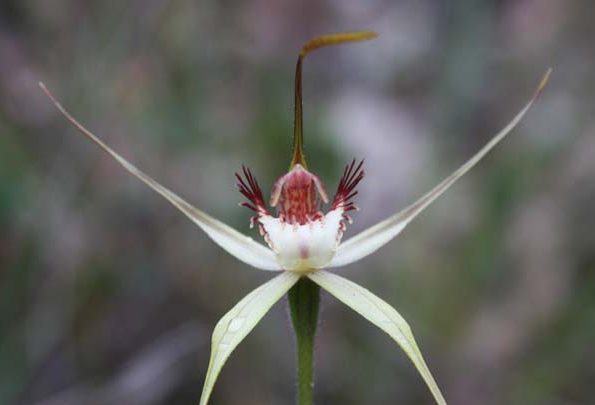
By Tracey Ferrier in Brisbane
Under the cover of darkness, a well-educated thief crept into a conservation garden and stole some of the rarest plants on earth.
There were no cameras trained on bare-looking patches of ground in Perth’s Kings Park and Botanic Garden, where two species of threatened native orchids lay dormant for the summer, invisible under 15 centimetres of soil.
In early spring when the plants send up a leaf, a stalk and then bloom, they are captivating, with delicate spider-like legs that dance in the wind and draw the eye to their intricate pink-tinged centres.
But a fortnight ago, when 900 or so carefully cultivated specimens were swiped, they were nothing more than subterranean tubers – small marble-like structures that hold enough energy to fuel the next growth spurt.
“Because they were taken while they were dormant we feel it was someone who knew what they were doing. They are at their most transportable and robust while dormant,” orchid research scientist Belinda Davis says.
“I don’t know where they’ve gone, but if they were going overseas it’s much easier to send a tuber than it is to send a live plant.”
The black market in protected orchids is a global scourge that continues to boom despite international efforts.
And the stakes could not be higher for naturally rare plants that have been lusted after since the Victorian era, when wealthy fanatics sent explorers to all corners of the globe searching for specimens no-one else had.
They even gave the fixation a name: orchidelirium – essentially a kind of flower-driven madness.
Ecologist Mark Brundrett, from the University of WA, is among a dedicated band of volunteers who monitor the state’s rare, wild orchids and he knows better than most what that madness can do.
He has many stories to tell about plants being there one day and gone the next.
“We don’t know if it’s orchid enthusiasts, people who have become obsessed with the beauty of them, but it seems to be a bit more organised than that,” he says.
He warns well-meaning enthusiasts who innocently post about their encounters with rare specimens may be unwittingly helping poachers.
“Everyone wants to photograph them and put them on Instagram. Unless you are careful, the photographs all contain coordinates, where they were taken, embedded in them.”
Then there’s the risks posed by word of mouth – innocent, excited stories about wild encounters shared and re-shared until they reach the wrong people. And another plant vanishes.
Katharina Nargar is part of an international group of specialists fighting to conserve the world’s 29,000 protected orchid species, and says social media platforms are at the heart of the illicit trade.
“They have these closed groups with direct messaging, and social media has made it much easier for sellers to receive payments,” says Dr Nargar, who leads orchid research at the Australian Tropical Herbarium.
She points to a study that shows orchid hobbyists who buy online have a preference for rare species, which is bad news for Australia given more than 90 per cent of the country’s 1700 orchids are not found anywhere else.
“They specifically seek out things that are not traded in nurseries, they are not interested in plants that have been bred, they want the natural, rare species – collectors items.
“It’s like they are loving these plants to death. And it puts a big pressure on plants that are already rare in the environment. It’s a huge conservation problem.”
Every orchid species on earth is protected under the Convention on International Trade in Endangered Species of Wild Fauna and Flora.
Some species can be legally traded, with appropriate permits and assurances they have been artificially propagated, not stolen from the wild.
But Dr Nargar says it’s extremely difficult to know if such assurances are true, and it requires sophisticated stable isotope or genetic analysis to be sure of a plant’s provenance.
That’s not something available at international border checkpoints, where stolen orchids are often passed off as legitimately cultivated ones.
Back in Perth, police are continuing to search for the Kings Parks orchid thief. Or thieves.
It’s possible more than one person was involved in taking the tubers of threatened Carbunup King Spider and Collie Spider Orchids.
It’s estimated there are just 1100 left in the wild, in very small, confined locations that have a particular type of vegetation.
Dr Davis, from Kings Park, says the 900 stolen were all carefully propagated by scientists involved in research projects to boost the species’ survival prospects.
They were the result of years of work and, in a first, planted in a publicly accessible location.
The idea was that if people could see the rare orchids in an easy to access setting, it might reduce the compulsion for people to seek them out in the wild, after some plants were lost to trampling.
Dr Davis is carrying a deep sense of anger about the theft of specimens that were part of a buffer for shrinking wild populations.
“It was such a selfish act, and a reflection of what’s happening to them in the wild.
“There’s habitat loss and climate change and loss of pollinators, and all these things that sit over the top of them in the wild. They get down to quite small populations and every now and again someone will pick out a few.
“It’s a kick they really don’t need and here it is, happening in the park.”
Who can be trusted?
In a world of spin and confusion, there’s never been a more important time to support independent journalism in Canberra.
If you trust our work online and want to enforce the power of independent voices, I invite you to make a small contribution.
Every dollar of support is invested back into our journalism to help keep citynews.com.au strong and free.
Thank you,
Ian Meikle, editor





Leave a Reply